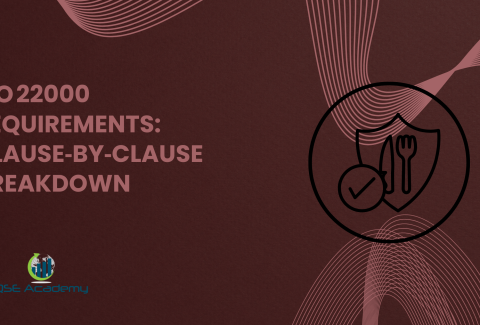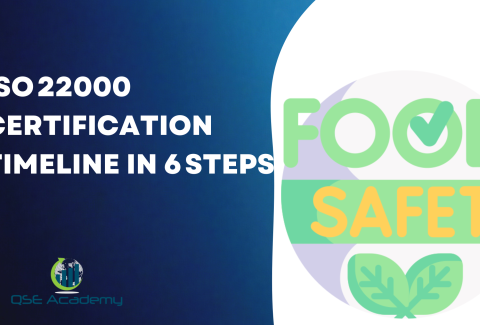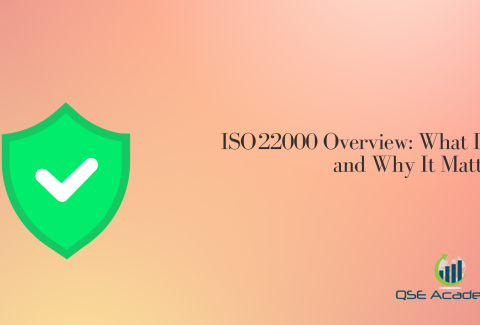IFS V8 Benefits for Food‑Manufacturing Companies
Last Updated on December 23, 2025 by Hafsa J.
Why Understanding the Benefits Matters
When companies explore IFS Food V8 certification, the first question is usually: “Is it worth it?”
And that’s a fair question. Certification takes time, resources, and real operational effort—not just paperwork.
I’ve worked with food manufacturers across Europe, Asia, and the Middle East, and the pattern is consistent: those who treat IFS as a strategic investment—not a compliance checkbox—see the biggest return.
If you’re reading this to understand whether IFS can help your business grow, reduce risk, or strengthen your position in the supply chain, you’re in the right place. By the end, you’ll have a clear picture of how IFS certification can:
- Open new markets and retail partnerships
- Improve operational consistency
- Reduce risk and costly mistakes
- Strengthen supplier control and accountability
- Support long-term business growth
Let’s dive into what actually matters.
Stronger Market Position & Retail Access
One of the biggest advantages of IFS certification is how it strengthens your credibility with European retailers—especially if you’re supplying private-label products. Many well-known supermarket groups in Germany, France, Italy, and Spain either prefer or require IFS certification from their manufacturers.
I’ve seen companies unlock contracts simply because the certificate demonstrated reliability and maturity. One bakery client told me:
“It wasn’t the product that won the retail listing—it was the certification.”
IFS serves as proof that you’re not just compliant—you’re operating at a controlled, auditable, and internationally recognized level.
Pro Tip: Highlight your IFS certification on product catalogs, tender documents, and supplier approval forms. It signals professionalism immediately.
 Improved Operational Consistency & Process Control
Improved Operational Consistency & Process Control
IFS isn’t only about passing an annual audit—it’s about driving consistency across every production shift.
The scoring structure, KO (knock-out) requirements, and emphasis on process execution mean your systems can’t just exist on paper—they must live on the production floor.
Most facilities experience improvements in:
- Allergen handling
- Cleaning and sanitation
- Process validation and monitoring
- Traceability speed
- Change-control discipline
- Reduction in production variances
A beverage manufacturer I supported once joked:
“Before IFS, we were good. After IFS, we were predictable.”
And in food safety, predictability is a powerful advantage.
Reduced Risk, Recalls, & Costly Non-Conformities
This is where IFS can save serious money. Recalls, withdrawals, and major non-conformities cost far more than the certification itself.
IFS helps reduce risk because it requires systematic control over areas that commonly trigger incidents, including:
- Mislabeling and allergen errors
- Contamination and foreign-body controls
- Supplier-related failures
- Inadequate traceability or mock-recall delays
When controls are strong, error rates drop—and so do financial and reputational costs.
Pro Tip: Pay extra attention to KO points. They exist because they reflect real-world high-risk patterns.
Better Supplier Oversight & Raw-Material Assurance
IFS doesn’t just focus on your production floor—it strengthens your entire upstream chain.
Supplier approval, evaluation, and monitoring requirements push manufacturers to verify—not just trust—their raw-material sources.
This leads to fewer surprises and fewer downstream quality failures.
A meat processor once told me:
“Once we tightened supplier controls, half of our recurring customer complaints disappeared.”
Strong supplier management protects your brand before the product even enters your facility.
Competitive Advantage in Bids, Contracts & Global Expansion
IFS certification can turn into a deciding factor when customers are comparing suppliers. Retailers, brands, and distributors see certification as a sign that you’re capable of consistent quality and scale.
For growing companies, IFS becomes:
- A differentiator in procurement processes
- A credibility boost when entering new regions
- A non-negotiable requirement during export expansion
And yes—some buyers skip suppliers who aren’t certified, even if the product is excellent.
Pro Tip: Use your certification proactively—not defensively. It’s a strategic tool.
Culture, Accountability & Continuous Improvement
IFS V8 places emphasis on food-safety culture. That means everyone—from operators to leadership—must be aligned on responsibilities and behaviors.
The shift is noticeable.
Instead of relying on one or two quality champions, responsibility becomes shared across departments. Over time, the mindset evolves from:
“Fix the problem later”
to
“Prevent the problem now.”
And that change alone can transform product quality, compliance, employee engagement, and continuous improvement momentum.
Long-Term Cost Efficiency & Real Business ROI
This part often gets overlooked: certification can reduce operating costs long-term.
When systems are repeatable and predictable, costs linked to:
- Rework
- Wastage
- Production delays
- Supplier failures
- Audit remediation
- Customer complaints
naturally decrease.
One plant manager said something I still remember:
“IFS didn’t just make us safer—it made us smarter.”
And that’s exactly the point.
FAQs — Short Answers to Common Questions
Is IFS worth pursuing if we don’t sell to Europe yet?
Yes—if export or large retail partnerships are part of your future strategy.
Does certification improve product quality?
Indirectly, yes. Better systems lead to better output.
Is it harder than other food-safety standards?
It depends on your current operational discipline—not the standard.
Conclusion — A Strategic Investment for Growth-Focused Manufacturers
IFS V8 isn’t just about compliance—it’s about strengthening your business. Companies that adopt the standard see improvements not only in safety and quality, but also in efficiency, credibility, and long-term growth potential.
If you’re exploring whether certification is the right next step, a simple readiness assessment or gap analysis can give you a clear starting point.
Whether it’s ISO 9001, ISO 22000, or the cosmetics-focused ISO 22716, I’ve spent my career I’m not here to call myself an expert—I prefer “enthusiast” because I truly love what I do. When I’m not writing about standards, you’ll probably find me playing Piano 🎹, connecting with people, or diving into my next big project💫. I’m an engineer specialized in the food and agricultural industry
make ISO standards less intimidating and more approachable for everyone.
turning complex jargon into clear, actionable steps that businesses can actually use.
There’s something incredibly rewarding about helping people navigate food safety and quality management systems
in a way that feels simple, practical, and even enjoyable.
I have a Master’s in QHSE management and over 12 years of experience as a Quality Manager
I’ve helped more than 15 companies implement ISO 9001, ISO 22000, ISO 22716, GMP, and other standards
My clients include food producers, cosmetics manufacturers, laboratories, and service companies
I believe quality systems should be simple, useful, and efficient.










